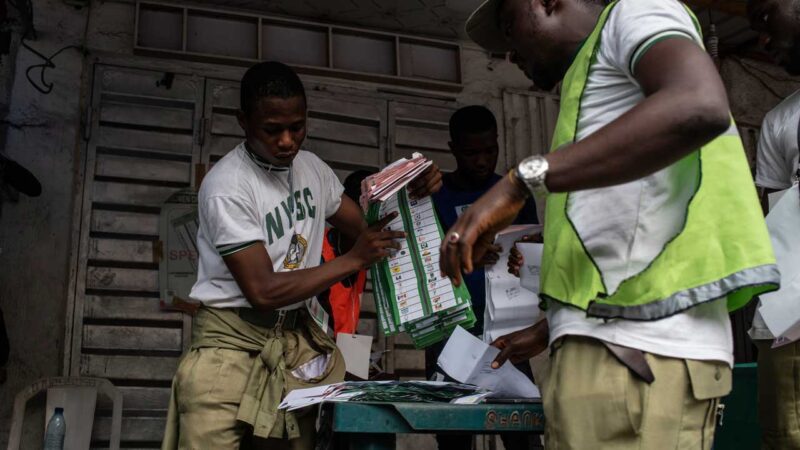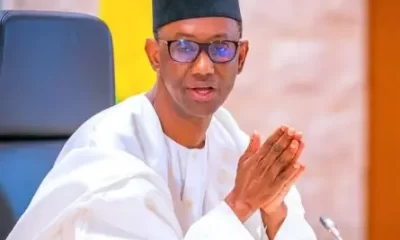Political Issues
Post Election: What Happens To The Mandate? -By Abdu Abdullahi
The mandate phenomenon occupies the central stage of governmental activities but is less attractive for its overall effectiveness. Perhaps, we may revert to the drawing board to remind mandate carriers that in every mandate lies political compulsion and obligation. The mandate does not need a redefining much as leaders need redefining to emphasize their role expectations.

Winning an election is the ultimate aim of every politician. When people say election is won, I ask the question, which victory are we talking about? Apart from the votes cast by voters for their candidates at the polling stations, we have our electoral expectations which make up the mandate our leaders must make or mar. In a philosophical term, therefore, it is when the mandate is fulfilled that an election is really won.
However, fulfilling the mandate requires that the bearers execute the working template on which basis election was fought and won. The catalogue of promises made to the electorates to woo their support will not cease to be a forgotten theme. But holistic fulfillment is something seldomly achieved by many leaders. For where? Who will prosecute them for political felony? They don’t give a damn about the non actualisation of the mandate.
Most of the elected lack the political will to form a coalition of expediency to weather the storm and win the mandate. We must shun the trend of winning the election but losing the mandate. Forget not that actualising the mandate is historically connected with divinity. It has its genesis from the antecedent of the Prophets. The Prophets of Allah had awesomely delivered on the mandate given them without necessarily resorting to pride on their choice as noble Prophets. In their prophethood, they saw a divine task which was carefully and successfully handled and administered. From this, leaders ought to draw inspiration for a successful mandate delivery,for they are the messengers of government and not the government themselves.
I only have less confidence in election if it cannot meet our collective fulfillments. But it raises our expectations and increases our democratic participation only to be disappointed by non-functional mandate. What else is new about election? There is always a winner and a loser. There are always complaints here and there, some real while others imagined. However, nobody raises alarm when the mandate is dislocated. Beyond election definitely, there is the burden of mandate which elected politicians must strive to win and fulfil the essence of elections.
Although elections are in themselves a democratic heritage, value and process that enthrone leaders yet, the mandate entrust on them are often scandalized and allowed to erode its prime essentiality and functionality. We have seen regrettable situations in which the mandate is grossly scattered to favour the leader and his cronies. The people’s mandate does not belong to an individual. It is a trust for which the bearer will be accountable to both Allah and the people. The mandate is meant to improve the quality of general living but not to promote the standards of living of a few individuals.
Prior to elections, political soldiers build in our minds a strong optimism for fulfilling the mandate. But when the season of elections is over, the effects of governing mandate on the people are largely not ubiquitous. The joy of a politician, therefore, should go beyond winning an election if the mandate is not put into its proper dispensation to touch our living.Elected politicians should be mindful and responsive that they have signed a political covenant with the electorates to implement to boost their general well-being.
If we are to go solemnly by fairness, successful politicians are not those who win elections for winning sake, but they are the genius whose unflinching faith in mandate actualisation is quintessential. Reminiscence in nostalgia, the late Umaru Musa Yaradua devoted his leadership to mandate implementation even though he faulted the electoral process that brought him to power. He was a practical prototype of a mandate player who had more deep passion in impacting mandate than winning an election.
By keen observations, many politicians are jittery of losing an election but only few are timid of not fulfilling their mandate. Are we saying that politics begins and ends with election? Not at all! If we erroneously believe that politics begins and ends with election, then the mandate is a dead political entity. When an average politician always thinks of the next election, I will assume that he or she has not done well regarding his possessive mandate. But when adequately done with the mandate, the elected will naturally reflect on the next mandate and not election again, for the successful execution of the mandate will give such a leader a clear ticket of victory in the next election.
The mandate phenomenon occupies the central stage of governmental activities but is less attractive for its overall effectiveness. Perhaps, we may revert to the drawing board to remind mandate carriers that in every mandate lies political compulsion and obligation. The mandate does not need a redefining much as leaders need redefining to emphasize their role expectations. A government that successfully showcases its mandate is unhampered by all irrational activities, policies and programs and there is a unique ability to install the mandate for desirable actions and results.
Will it be suggestive that the kind of unrivalled vigor, planning and mass resources deployed to win an election by aspirants should be on the same level when it comes to delivering on mandate? This is because over the years, the people’s mandate at all levels of governmental affairs has suffered a great set back. The best way to rank our leaders is evaluating the implementation of the mandate. Is he the type who dodges responsibility to address the growing class of the youths who are extremely ambitious and energetic, but exploited and oppressed? Is it the leader that facilitates instability in a government’s internal functioning?
We are in a democracy. We have every right to query our leaders about mandate situation because it is our mandate as well. What happens to our mandate? Among the leaders that has answers to this knocking question is President Lula Da Silva of Brazil. Hear him: ” If, at the end of my mandate, all Brazilians have the possibility to eat breakfast, lunch and dinner, I will have fulfilled the mission of my life.”
Like elections, mandate can also be rigged when we are not given what rightly belongs to us in terms of devoted leadership, and we are not repaid with the same coin that we voted our leaders. In post polls situations, it is noted that mandate is not fully registered as a political and desirable element that improves quality leadership by many elected persons. A high quality leadership is only attainable when authorization bestowed upon individuals is a barometer for measuring progress.
President-elect Bola Ahmed Tinubu’s has a new campaign of government of ‘national competence’. It can be a prominent lead to actualising mandate. If competence can act very well, our mandate will not be sacrificed for incompetence. The partial or total collapse of the mandate structure is unaffordable and will not augur well for the system of democracy to thrive.
This is a clarion call to all elected politicians. Election brouhaha is over.To actually justify winning the polls, the mandate must be pursued to its logical conclusion and improve the people’s living.










